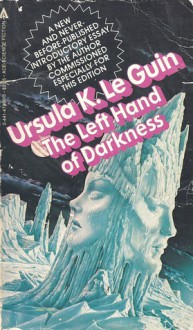

I did not want this to end. I feel a bit bereft, and very emotional, and somewhat fragile (even if Rocannon's World had prepared me for the possibility). And in awe. Dazzled in awe of how Le Guin can weave this beautiful settings to address concepts, limitations, canons of society, give them new perspectives and lead into discussions well before their time.
She did warn in a way, in that introduction. Because... it might be that I had late access to the Internet, and so was somewhat cut out from the world-dialogue, but it looks to me that talk of gradients and varieties of sex and sexuality (beyond the ever polemical homosexual, bisexual or trans-gender, and those as isolated phenomenons at that), is pretty recent. Yet here it is, served as a "fait acompli" in the form of a world where gender has always been a fluid thing, when it's even a thing, and the protagonist just has to deal, get over and past it, once and for all. Let me tell you, I had some fun mocking the MC over his inability to accept, because at some point, it annoyed me. Which is exactly the point of the book, I think.
Tied to that, all the issues of friendship, love, miss/understanding, acceptance, and what have you, in an epic sprinkled with back-ground myths and wrapped up in a sci-fi package. And by all the literary muses, I loved it.


it was necessary to keep the mouth closed and breathe through the nose, at least when the air was forty or fifty degrees below freezing. When it went on lower than that, the whole breathing process was further complicated by the rapid freezing of one's exhaled breath; if you didn't look out your nostrils might freeze shut, and then to keep from suffocating you would gasp in a lungful of razors.
Under certain conditions our exhalations freezing instantly made a tiny crackling noise, like distant firecrackers, and a shower of crystals: each breath a snowstorm.
*wince* This is making me ache with cold by proxy. Good summer read I'd say.
On a usual day we would have pulled for eleven or twelve hours, and made between twelve and eighteen miles.
It does not seem a very good rate, but then conditions were a bit adverse.
You don't say... (he's not even referring to the cold, the confident bastard)


"In danger, honor," he said, evidently a proverb, for he added mildly, "We'll be full of honor when we reach Karhide…"
Estrevan is made of awesome.
A friend. What is a friend, in a world where any friend may be a lover at a new phase of the moon? Not I, locked in my virility:
There is quite a bit to address on the fallacy of this one. As in, not the author's, but our own society, which is reflected in the text: this expectation of binary, and how it messes up what would be consider friendship when it is not met, which is pretty stupid, and a throw back to the old "can man an woman be friends?". It's been subtly pointed out, every time Genly is repulsed when Estrevan exhibits what he considers feminine traits or though patterns. He can't be sexually attracted because of the male parts, but he can't consider the other a friend for the female. Sad, huh?


Mother of all introductions!
LeGuin talks about what sci-fi is supposed to be (she actually relegates that typical non-readers perception to a sub-field: "strictly extrapolative science fiction"), what a fiction writer is, and an artist, what sci-fi tries to tackle, truth, and words, and wow, lol.
I was about to add some bit of quote or other, and realized I have about ten from the intro alone.
Opening of the book then:
I'll make my report as if I told a story, for I was taught as a child on my homeworld that Truth is a matter of the imagination. The soundest fact may fail or prevail in the style of its telling: like that singular organic jewel of our seas, which grows brighter as one woman wears it and, worn by another, dulls and goes to dust. Facts are no more solid, coherent, round, and real than pearls are. But both are sensitive.
